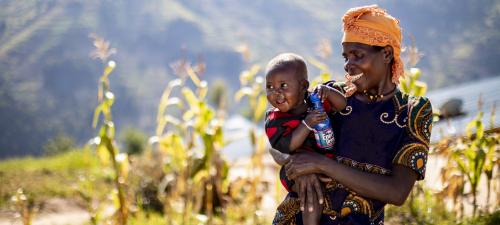Investing in rural women and girls, ‘essential’ for everyone’s future: UN chief
Marking International Day of Rural Women, on Monday, United Nations Secretary-General António Guterres called on countries to ensure that women and girls living in rural areas can enioy their human rights as this would enable making “progress for all”.

The poorest and most vulnerable people in Rwanda have benefited from the “Green Village” concept, a Rwandan government initiative which is supported by UNDP and UN Environment, that aims to tackle the African country’s growing natural resource challenges, including deforestation, soil erosion, access to water and unsustainable land use.
“The empowerment of rural women and girls is essential to building a prosperous, equitable and peaceful future for all on a healthy planet,” he said, stressing that “it is needed for achieving gender equality, ensuring decent work for all, eradicating poverty and hunger and taking climate action”.
Rural women make up 43 per cent of the agricultural labour force in developing countries, in work that is often informal and poorly paid, offering little access to social protection or income security.
As child labour is common in the countryside, girls form a significant part of the agricultural workforce. This means rural women and girls remain disproportionately affected by poverty, inequality, exclusion and the effects of climate change.
“I call on countries to take action to ensure that rural women and girls fully enjoy their human rights,” said Mr. Guterres, explaining that that includes the right to land and security of land tenure; to adequate food and nutrition and a life free of all forms of violence, discrimination and harmful practices. He added that every woman and girl should expect the highest attainable standard of health, including sexual and reproductive health; and has a right to quality, affordable and accessible education.
Women and girls are responsible for water collection and fuel collection in most rural households without access to drinking water or electricity. The arduous journey often takes several hours, poses many safety risks and hampers their ability to get an education or make a living.
In addition, cooking with unclean fuels can result in long-term and even fatal health problems for women, said Mr. Guterres. In countries that rely heavily on fuels like coal, wood, manure or crop waste for cooking, women account for 6 out of every 10 premature deaths through household air pollution.
Stating that improving the lives of women and girls in rural areas requires “legal and policy reforms” and their inclusion in the decisions that affect their lives, the UN chief stressed that “investing in [their] well-being, livelihoods and resilience, we make progress for all”.
Noting the critical role that women’s groups play in sustainable development, the UN’s gender-quality agency, UN Women, noted that enhanced access to safe drinking water and sanitation brings gains in girls’ education and eventually increases women’s paid work to generate goods and provide services. Extending the reach of water grids and continuous piped drinking water to rural communities, is therefore an important priority with multiple benefits.
In addition, rural women’s cooperatives are providing childcare services for - and by - their members around the world.
“But small-scale solutions are not enough,” said UN Women’s statement, explaining that these efforts “must be joined by large-scale institutional initiatives that invest in a different future, in which women and girls participate and benefit equally, to men and boys”.
Source:United Nations
- 296 reads
Human Rights
Fostering a More Humane World: The 28th Eurasian Economic Summi

Conscience, Hope, and Action: Keys to Global Peace and Sustainability

Ringing FOWPAL’s Peace Bell for the World:Nobel Peace Prize Laureates’ Visions and Actions

Protecting the World’s Cultural Diversity for a Sustainable Future

Puppet Show I International Friendship Day 2020

